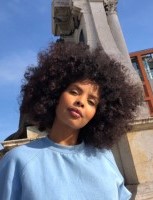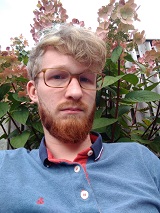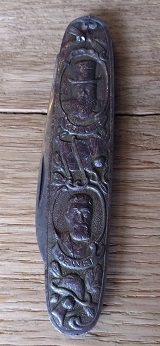Get to know the new master students!
Hodo Hassan (23) and Jochem Scheelings (24) are two of our new students of the Master in African Studies. Curious about their background, their motivation to do African Studies, and their career expectations for the future? Read their personal stories to get to know them better!
Hodo Hassan
 Tell us a bit about your background, and where does your interest in Africa come from?
Tell us a bit about your background, and where does your interest in Africa come from?
'My name is Hodo, and I’m currently completing my master's in African Studies. My home country, Somalia, has been kept in a perpetual state of crisis and instability, due to a lack of regard to the Rule of Law. All of this cemented my refugee status long before I was born. The most formative years of my life consisted of frequent relocation from one refugee camp to another. These years were marred by uncomfortable living conditions, everlasting periods of drought and subpar access to food, clean water and sanitation. Migrating to the UK at the age of 15 signalled a new beginning for me. Without this opportunity, my life likely would have followed the trajectory of millions of child wives, who remain marginalised and silenced. This has further bolstered my interest in the African continent. I hold a BA in Philosophy from the University of Warwick.'
Jochem Scheelings
 Tell us a bit about your background, and where does your interest in Africa come from?
Tell us a bit about your background, and where does your interest in Africa come from?
‘I did my BA in History at Utrecht University. I focused on the colonial history of Southern Africa, and a little bit on West Africa, Liberia in particular.
 ‘I found out that I am very much interested in Africa in 2016, when I still studied English Literature and Linguistics. During a course about the history of Britain – which of course also dealt with British colonialism in Southern Africa – I made a sidestep to Dutch history in South Africa. And started to read about other colonial extensions of the Netherlands in the rest of the world. I switched studies to history. From a friend’s South African neighbour, I even received a knife that was made as a keepsake of one of the Boer Wars. It has the profiles of Kruger and De Wet carved in it. It is originally from the Boerenrepubliek, but these sort of souvenirs were also produced in the Netherlands at the time.’
‘I found out that I am very much interested in Africa in 2016, when I still studied English Literature and Linguistics. During a course about the history of Britain – which of course also dealt with British colonialism in Southern Africa – I made a sidestep to Dutch history in South Africa. And started to read about other colonial extensions of the Netherlands in the rest of the world. I switched studies to history. From a friend’s South African neighbour, I even received a knife that was made as a keepsake of one of the Boer Wars. It has the profiles of Kruger and De Wet carved in it. It is originally from the Boerenrepubliek, but these sort of souvenirs were also produced in the Netherlands at the time.’
What region or theme would you like to focus on during your Master?
‘At the moment I am thinking about the subject for my master’s thesis. Since we can’t do an internship in Africa due to COVID-19 - which I really find a shame - I have to find a subject that I can research in the Netherlands. It will either be a study of Aquasie Boachi (or Kwasi Boakye as he was called in Dutch), one of the two Ashanti princes that were sent to the Netherlands in the 19th century. He completed his studies at Delft Technical University. Or, I would like to write about school books and prints from around 1850 about Dutch possessions in Africa, which are in the Rijksmuseum.
‘My big interest, however, is in German colonial Africa. We know a great deal about Namibia’s history, but the Dutch don’t know about Tanganyika or Togoland. The problem is that the German colonial archives are in Frankfurt, and I can’t go there now.’
How do you see yourself in the future, doing what professionally?
‘I’m hoping that something will come out of our internships… I just wrote to the Royal Tropical Institute. I don’t see myself working in business. Getting an internship organised is now top of my priorities.’

